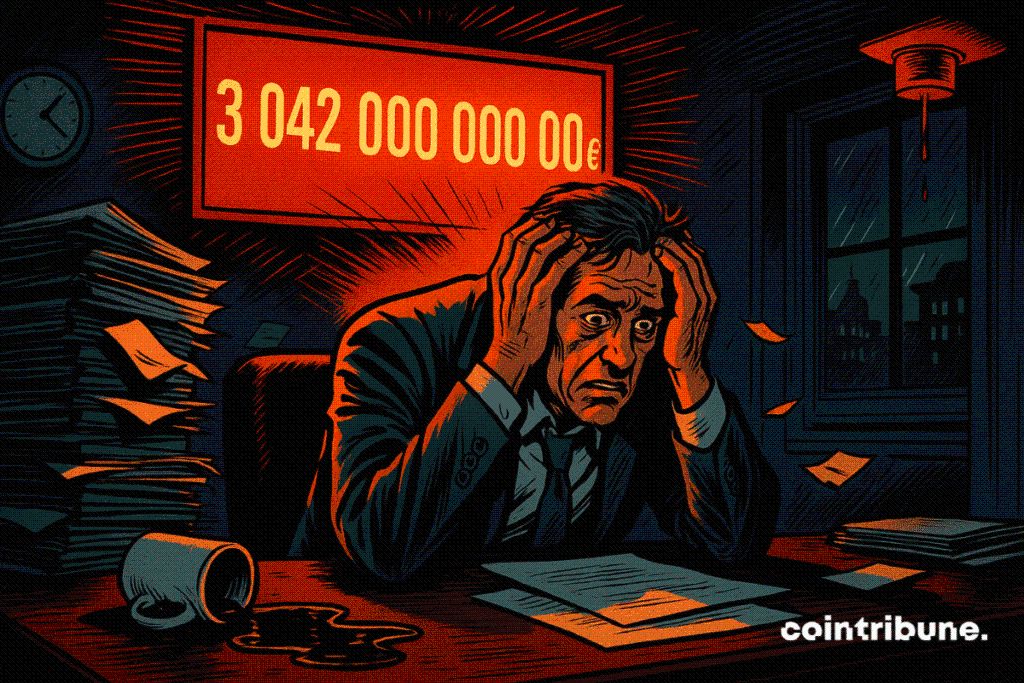French Debt Debate Escalates With Bayrou’s Warning
In France, public debt crystallizes political tensions, shocks the markets, and weakens budgetary sovereignty. With more than €3,400 billion to repay and sharply rising rates, the country faces an unprecedented risk. François Bayrou even raised the threat of being put under IMF supervision, while investors are beginning to doubt.

In brief
- French public debt now reaches €3,411 billion, with a dizzying increase of €5,000 every second.
- Markets react: the 10-year rate climbs to 3.49 %, higher than Spain’s and close to Italy’s.
- Debt servicing becomes the state’s largest budget item, with €66 billion planned this year.
- The Prime Minister criticizes debt used for current expenses rather than investment.
Market warning and the growing weight of debt servicing
Monday evening, French public debt reached €3,411 billion, increasing at a pace of €5,000 per second. This critical dynamic is beginning to worry the markets , as reflected in the rapid rise in rates demanded by investors to lend to the State.
The 10-year French debt rate jumped to 3.49 %, compared to 3.24 % for Spain and close to Italy’s 3.51 %. “There is tension in the bond segment, which means France borrows more expensively today since François Bayrou’s announcements,” explained Andréa Tueni, market head at Saxo Bank.
In barely two days, visible pressure has been exerted on the country’s financing conditions.
Behind this bond tension, several objective elements contribute to increasing the public debt bill :
- Debt servicing is now the State’s largest budget item, ahead of National Education and Defense, with €66 billion planned for this year, according to official estimates ;
- Markets penalize the lack of budget arbitration : “we lowered many taxes, raised a series of expenses, but there was never arbitration between the two”, highlights economist Philippe Waetcher ;
- Despite this situation, France still has access to markets: early August, it successfully raised €4.5 billion over 10 years, proving confidence is not completely broken.
Indeed, rising rates are not only a technical signal. They mark a turning point in the perception of France’s budgetary solidity. While the current situation does not yet evoke a crisis, it confirms entry into a phase where each new loan costs more, further weakening already precarious balances.
Poorly targeted debt, a collective effort to redefine
Beyond the numbers, the very foundations of French public debt are now criticized. Prime Minister François Bayrou, in a speech, made a harsh assessment. “Debt is each of us,” he stated , pointing to excessive use of public funds for short-term spending.
He believes this colossal debt, which increased by €2,000 billion in twenty years, has been “consumed in current spending and protection of our citizens”, notably citing Covid-related measures, pensions, reduced VAT, and public servants ’ salary increases. He would have preferred debt oriented towards productive investment, judging that “bad debt chases out good debt”.
This structural criticism is shared, in other words, by the Governor of the Bank of France, François Villeroy de Galhau. In an interview, he calls for “a real public debate” on ways to get out of this deadlock, while stressing a “fair and shared” effort. While refraining from directly commenting on political announcements, he emphasizes that “our economic destiny is in our hands”.
Bayrou, for his part, presented an ambitious savings plan as of July, aiming for €44 billion, including cuts in health, local authorities, social benefits, and even mentioning the removal of public holidays. He forecasts a debt charge reaching €75 billion in 2026, and up to €107 billion in 2029 if no corrective measures are taken.
In this climate of distrust towards traditional monetary policies, cryptos, and particularly bitcoin, gain legitimacy in the eyes of many investors. Presented since its creation as an alternative to over-indebted state currencies, bitcoin regains a safe-haven role at moments when budgetary credibility falters. Its decentralized nature and algorithmic scarcity appeal to those fearing external intervention in public finances or a loss of monetary sovereignty.
This change of tone marks a major political inflection. By placing the debt issue at the heart of national debate, the government seeks to provoke collective awareness. However, this strategy also involves risks: social tension, political uncertainty, even strains with European partners. Can France then tap citizens’ savings to cover public debt?